Understanding Hearing Loss
Understanding the Mixed Hearing Loss Cause: A Comprehensive Guide
A journey into the intricate world of mixed hearing loss causes unveils surprising connections and personalized solutions.
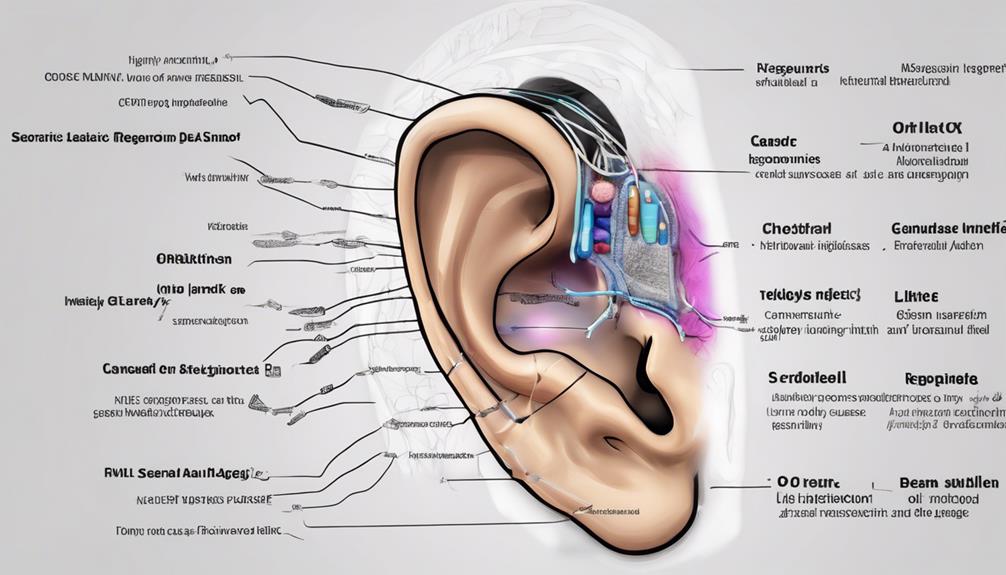
When delving into the complexities of mixed hearing loss, we are faced with a combination of sensorineural and conductive aspects, necessitating a tailored approach to treatment. The interaction of these factors reveals a complex condition stemming from a variety of causes, including exposure to loud noises and anatomical irregularities.
As we uncover the diverse triggers behind mixed hearing loss, a deeper understanding emerges, shedding light on personalized interventions to tackle this complex auditory challenge. Through unraveling the diverse causes and manifestations, a path unfolds towards tailored solutions, promising enhanced quality of life and auditory well-being.
Key Takeaways
- Mixed hearing loss results from a combination of conductive and sensorineural impairments.
- Genetic factors play a significant role in predisposing individuals to hearing loss.
- Treatment options include medication, surgery, hearing aids, and cochlear implants.
- Prevention involves avoiding loud noises, regular ear check-ups, and prompt treatment of underlying health issues.
Mixed Hearing Loss Overview
In understanding mixed hearing loss, we delve into the intricate interplay between conductive and sensorineural impairments. Mixed hearing loss is characterized by a combination of issues affecting both the outer or middle ear (conductive) and the inner ear (sensorineural). The causes of mixed hearing loss can vary widely, including factors such as chronic ear infections, otosclerosis, head trauma, genetic predispositions, or exposure to loud noises. The manifestation of symptoms may vary depending on the specific contributions of conductive and sensorineural components.
Diagnosing mixed hearing loss typically involves a comprehensive hearing test to assess the extent of both types of hearing impairments. Treatment options for mixed hearing loss are tailored to address the underlying factors contributing to the condition. These treatment strategies may include hearing aids, surgical interventions like tympanoplasty or stapedectomy, or cochlear implants for severe cases. Understanding the specific causes of mixed hearing loss is essential for developing effective management plans that optimize hearing outcomes for individuals with this complex condition.
Sensorineural Hearing Loss Causes
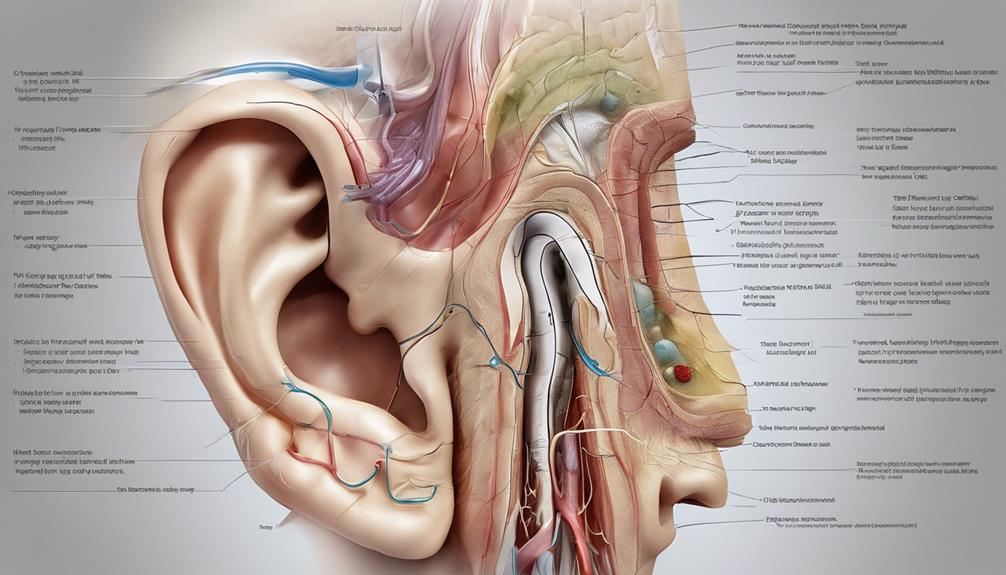
Sensorineural hearing loss causes encompass a range of factors, including aging, genetic predispositions, exposure to loud noises, and various medical conditions. When exploring the reasons behind sensorineural hearing loss, it's crucial to consider the following:
- Genetic factors play a significant role in predisposing individuals to sensorineural hearing loss.
- Exposure to loud noises over an extended period can damage the delicate hair cells in the inner ear, leading to hearing loss.
- Conditions like Meniere's disease, otosclerosis, and acoustic neuroma are known to cause sensorineural hearing loss.
- Certain medications, such as chemotherapy drugs and antibiotics, can have adverse effects on hearing health.
- Trauma to the head or inner ear, viral infections like meningitis, as well as underlying health issues like cardiovascular diseases, diabetes, and autoimmune disorders, can also contribute to sensorineural hearing loss.
Understanding these diverse causes is essential in managing and addressing sensorineural hearing loss effectively.
Conductive Hearing Loss Causes
Numerous factors contribute to conductive hearing loss, ranging from ear infections and abnormal bone growth to malformations in the ear structures. Ear infections, especially chronic ones, can lead to conductive hearing loss by causing inflammation and fluid buildup in the middle ear, affecting sound conduction. Similarly, earwax buildup can block the ear canal, preventing sound waves from reaching the eardrum effectively. Perforated eardrums, often a result of trauma or chronic infections, can disrupt the transmission of sound vibrations to the middle ear.
Abnormal bone growth in the ear, such as otosclerosis, can impede the movement of the stapes bone, further hindering sound transmission. Tumors in the middle ear, although less common, can also cause conductive hearing loss by interfering with the normal functioning of the ear structures. Malformations in the outer ear, middle ear, or ear canal from birth defects or genetic conditions can create obstacles for sound conduction, leading to hearing impairment. Understanding these various causes is crucial for proper diagnosis and treatment of conductive hearing loss.
Mixed Hearing Loss Symptoms
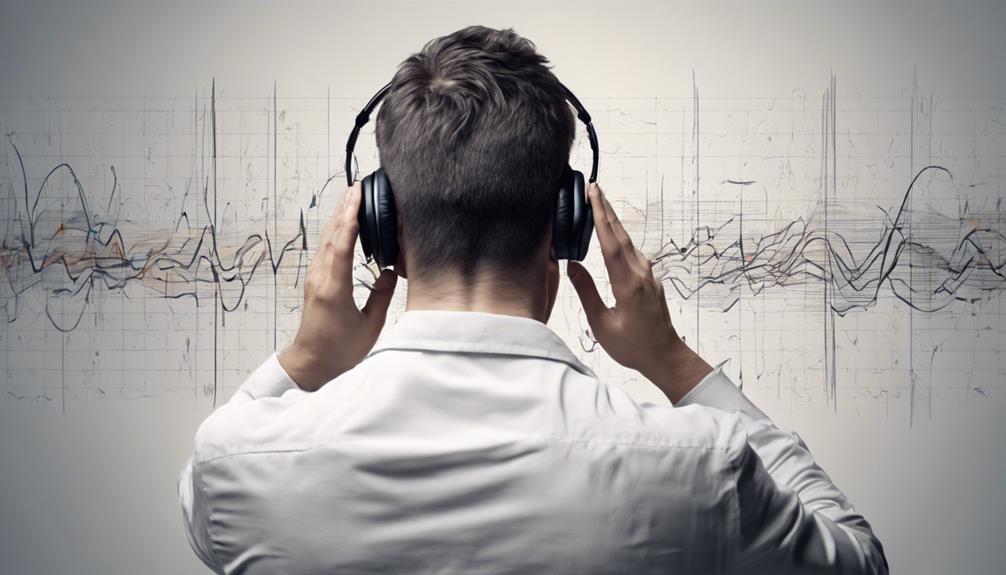
Mixed hearing loss symptoms manifest as a combination of difficulties in hearing soft sounds, understanding speech in noisy environments, and experiencing sensations of ear fullness, tinnitus, and dizziness. Patients with this condition may encounter fluctuations in hearing levels and struggle with the need for increased volume to perceive sounds effectively. Common challenges include difficulty in phone conversations and understanding dialogues in various settings. Seeking professional evaluation through audiometric tests is crucial for diagnosing and managing mixed hearing loss.
Below are key symptoms associated with mixed hearing loss:
- Difficulty hearing soft sounds and speech in noisy environments.
- Sensations of ear fullness.
- Tinnitus (ringing in the ears).
- Dizziness.
- Fluctuations in hearing levels and the need for increased volume.
Understanding these symptoms is essential for early detection and appropriate management of mixed hearing loss, which can significantly impact an individual's quality of life.
Treatment Approaches
Exploring various treatment approaches is crucial for effectively addressing mixed hearing loss. Options include medication, surgery, hearing aids, cochlear implants, or a combination of therapies. Treatment of the conductive component often involves surgical interventions or medications to restore hearing function.
On the other hand, managing the sensorineural component frequently necessitates the use of hearing aids to enhance hearing ability. Individualized treatment plans play a pivotal role in effectively addressing mixed hearing loss by tailoring interventions to the specific causes and severity of the condition.
Regular follow-ups and adjustments to treatment plans are essential for monitoring changes in the sensorineural component of mixed hearing loss over time, ensuring that interventions remain effective in improving overall hearing function. By employing a comprehensive approach that considers both the conductive and sensorineural aspects of mixed hearing loss, individuals can optimize their management strategies and enhance their quality of life.
Frequently Asked Questions
How Do You Explain Mixed Hearing Loss?
Mixed hearing loss combines conductive and sensorineural issues, impacting both the outer/middle ear and inner ear/auditory nerve. It presents unique challenges in sound processing, necessitating specialized treatment. Conductive causes include earwax or tumors, while sensorineural factors often stem from cochlear damage due to noise exposure.
Symptoms of mixed hearing loss encompass difficulty with quiet sounds, ear fullness, and a need for louder volume. Diagnosis involves various tests like audiometry and imaging to assess the condition's scope.
What Are the Implications of Mixed Hearing Loss?
When dealing with mixed hearing loss, we face challenges stemming from both conductive and sensorineural issues. This condition impacts sound conduction in the outer/middle ear and sound processing in the inner ear/auditory nerve.
Speech comprehension, especially in noisy settings, can be particularly difficult for individuals with this type of hearing loss. Addressing both components effectively is crucial for treatment, improving the individual's hearing ability, and enhancing their overall quality of life.
What Is the Treatment for Mixed Hearing Loss?
When it comes to treating mixed hearing loss, we focus on addressing both the conductive and sensorineural components. Medication or surgery can help with the conductive part, while hearing aids are often essential for managing the sensorineural aspect effectively. Personalized treatment plans are key, tailored to each case's unique evaluation.
In some instances, surgical interventions may be necessary, particularly for conductive issues. Regular check-ups and monitoring are vital for adjusting to changes in the sensorineural component over time.
What Are the 4 Types of Hearing Loss?
We've four types of hearing loss: conductive, sensorineural, mixed, and central hearing loss. Conductive hearing loss impacts the outer or middle ear, while sensorineural affects the inner ear or auditory nerve.
Mixed hearing loss is a combination of both conductive and sensorineural issues, whereas central hearing loss occurs in the central nervous system, affecting sound processing. Each type necessitates specific diagnostic and treatment strategies for effective management.
Conclusion
In conclusion, understanding the complexities of mixed hearing loss is essential for effectively addressing this condition. By recognizing the causes and symptoms, individuals can work with healthcare professionals to develop personalized treatment plans that improve their quality of life.
Remember, knowledge is power when it comes to managing hearing health, so don't hesitate to seek help if you suspect any issues. Stay informed and proactive in your journey towards better hearing!
Taylor brings a dynamic and analytical perspective to the Deaf Vibes team, focusing on research-driven content that educates and informs. With an unquenchable curiosity for new developments, policies, and social issues affecting the deaf and hard-of-hearing community, Taylor’s writing is a crucial resource for readers seeking to navigate these areas. Whether breaking down legal rights, highlighting educational opportunities, or offering guides on accessible technology, Taylor’s work is an invaluable asset to those seeking to empower themselves and others. Taylor’s commitment to accuracy and depth ensures that our readers have access to reliable and actionable information.
Understanding Hearing Loss
Does CMV Cause Hearing Loss? Understanding the Link
Yearning to unravel the mysterious connection between CMV and hearing loss? Discover the pivotal insights that shed light on this intriguing link.

When examining the possible effects of congenital CMV infection, one important factor to consider is its potential link to hearing loss in babies.
Understanding the intricate link between CMV and hearing impairment is crucial for addressing this concern effectively.
As we navigate through the complexities of this connection, it becomes evident that further exploration is needed to grasp the nuances of how CMV may contribute to hearing loss.
Stay tuned as we uncover more insights into this significant health issue and its implications.
Key Takeaways
- CMV contributes significantly to hearing loss, impacting inner ear structures and auditory pathways.
- Early detection is crucial for managing CMV-related hearing loss effectively.
- Research into CMV-induced mechanisms aids in developing targeted interventions.
- Tailored audiologic assessments and continuous monitoring are vital for mitigating CMV-related hearing loss.
CMV and Hearing Loss: An Overview
In the realm of pediatric otology, the intricate interplay between congenital cytomegalovirus (CMV) infection and the onset of sensorineural hearing loss stands as a prominent clinical concern. CMV, a common cause of sensorineural hearing loss in children, contributes to 15%-25% of clinically significant cases in the U.S. The virus's impact on the inner ear and auditory pathways can lead to hearing loss either at birth or progressively over time, necessitating regular monitoring. Risk factors for CMV-related hearing loss include direct viral damage, inflammatory responses, and high viral shedding at birth.
Early detection plays a crucial role in managing CMV-related hearing loss. For asymptomatic congenital CMV cases, implementing screening protocols can aid in timely identification. Additionally, interventions such as ganciclovir treatment for infants with central nervous system involvement show promise in reducing the adverse effects of CMV on hearing. Understanding the link between CMV and sensorineural hearing loss is pivotal in enhancing outcomes for affected children.
Research on CMV and Hearing Impairment

Our current research endeavors in the field of pediatric otology are focused on elucidating the intricate mechanisms underlying CMV-induced hearing impairment, aiming to enhance diagnostic precision and therapeutic outcomes for affected children. In our investigations, we delve into the pathophysiology of congenital CMV infection, particularly its association with sensorineural hearing loss in pediatric populations. Our studies emphasize the multifactorial nature of CMV-related hearing impairment, including the role of viral shedding dynamics, cytopathic effects on the auditory system, and inflammatory responses triggered by the virus. Additionally, we explore the benefits of early ganciclovir treatment in newborns with central nervous system involvement to mitigate the risk of hearing loss. Understanding the link between CMV infection and delayed-onset hearing loss is pivotal for developing targeted interventions and improving long-term auditory outcomes in children at risk. Through our rigorous investigations, we aim to advance the scientific understanding of CMV-induced hearing impairment and pave the way for more effective management strategies.
| Research Focus | Key Findings | Implications |
|---|---|---|
| Pathophysiology of CMV | Cytopathic effects, inflammatory responses | Targeted therapies, early intervention |
| Ganciclovir Treatment | CNS involvement, reduced hearing loss risk | Improved outcomes, therapeutic advancements |
| Viral Shedding Dynamics | Delayed hearing loss mechanisms | Early identification, personalized interventions |
Understanding the CMV-Hearing Loss Connection
Exploring the intricate interplay between CMV infection and the development of hearing loss unveils crucial insights into diagnostic strategies and targeted interventions for affected individuals.
CMV-related hearing loss, often sensorineural in nature, can manifest as congenital or progressive, affecting both symptomatic and asymptomatic individuals.
The pathogenesis of CMV-related hearing loss involves a complex interplay of direct cellular damage and inflammatory responses, contributing to the variability in symptom severity observed among cases.
Factors such as high CMV shedding at birth pose significant risk factors for hearing loss, necessitating early detection and intervention to mitigate long-term auditory complications.
Understanding the dynamics of CMV shedding and its correlation with hearing loss can aid in the identification of high-risk individuals, enabling timely interventions and support.
Early Detection of CMV-Related Hearing Loss

An early and precise evaluation of auditory function is imperative for promptly identifying and managing CMV-related hearing loss.
- Infants born with congenital cytomegalovirus infection are at risk of developing sensorineural hearing loss.
- Audiologic evaluations should commence shortly after birth to detect any signs of CMV-related hearing loss.
- Regular monitoring through customized hearing assessments is crucial to track the progression of hearing loss associated with CMV infection.
- Due to the potential for progressive or late-onset hearing loss in CMV-infected children, continuous audiologic care is necessary to ensure early intervention and effective management strategies.
Early intervention plays a vital role in mitigating the impact of CMV-related hearing loss on affected individuals. Therefore, regular audiologic evaluations and tailored interventions are essential components in the comprehensive care of infants with congenital cytomegalovirus infection. By closely monitoring auditory function and implementing timely interventions, healthcare providers can help improve outcomes for children at risk of CMV-induced hearing loss.
Intervention Strategies for CMV-Induced Hearing Loss
Interventions for CMV-induced hearing loss typically involve frequent audiologic assessments tailored to the individual's condition to ensure timely and effective management. Customized hearing evaluations play a pivotal role in addressing CMV-related hearing loss, especially in infants with congenital CMV infection.
Due to the progressive and potentially late-onset nature of hearing impairment associated with congenital CMV, continuous monitoring is crucial for early detection and intervention. Prevention strategies primarily focus on reducing the incidence of primary CMV infection through stringent hygiene practices.
While a vaccine for CMV is currently unavailable, raising awareness and implementing control measures are essential in combating CMV-induced hearing loss. By emphasizing early and ongoing audiologic evaluations, tailored interventions, and preventive measures, the impact of CMV on hearing outcomes can be mitigated.
Comprehensive strategies encompassing personalized care, vigilant monitoring, and public health initiatives are imperative in addressing the complexities of CMV-induced hearing loss.
Frequently Asked Questions
How Does CMV Affect Hearing?
CMV impacts hearing by causing sensorineural hearing loss in children. Around 10-15% of CMV-infected kids can develop some degree of hearing impairment, ranging from mild to profound in one or both ears.
This hearing loss may progress over time or appear later in life, underscoring the importance of continuous monitoring. Research into how CMV affects hearing is ongoing to enhance management strategies for this condition.
What Are the Neurological Symptoms of Cmv?
Neurological symptoms of CMV encompass a spectrum of manifestations, including cognitive impairment, developmental delays, motor skill deficits, seizures, and microcephaly.
The impact on an individual's quality of life can vary in severity, necessitating early detection and intervention.
Understanding the breadth of these symptoms is crucial for effective management and treatment.
We must prioritize vigilance in recognizing and addressing the neurological implications of CMV infection to optimize outcomes for affected individuals.
What Is the Auditory Outcome of Congenital Cytomegalovirus Infection?
When considering the auditory outcome of congenital cytomegalovirus (CMV) infection, it's essential to acknowledge the potential impact on hearing abilities.
In some cases, children affected by CMV may experience a spectrum of hearing loss, ranging from mild to profound, with variations in the onset and progression of auditory impairments.
Regular audiological evaluations are crucial for timely detection and monitoring of any CMV-related hearing difficulties to provide appropriate interventions.
What Is the Most Common Manifestation of Cmv?
The most common manifestation of CMV is sensorineural hearing loss. This condition, prevalent in children, can account for up to 25% of significant hearing loss cases in the U.S.
CMV-related hearing loss may present at birth or develop during childhood. Factors contributing to this pathogenesis include direct cytopathic effects and inflammatory responses.
Early detection and monitoring are crucial in managing hearing loss in children with congenital CMV infection.
Conclusion
In conclusion, our research highlights the intricate relationship between CMV infection and hearing loss in infants. Early detection and interventions play a crucial role in managing this condition.
Just as a skilled surgeon uses precision instruments to navigate delicate structures in the body, so too must we approach CMV-induced hearing loss with vigilance and care.
By staying informed and proactive, we can strive towards better outcomes for those affected by this significant health concern.
Taylor brings a dynamic and analytical perspective to the Deaf Vibes team, focusing on research-driven content that educates and informs. With an unquenchable curiosity for new developments, policies, and social issues affecting the deaf and hard-of-hearing community, Taylor’s writing is a crucial resource for readers seeking to navigate these areas. Whether breaking down legal rights, highlighting educational opportunities, or offering guides on accessible technology, Taylor’s work is an invaluable asset to those seeking to empower themselves and others. Taylor’s commitment to accuracy and depth ensures that our readers have access to reliable and actionable information.
Understanding Hearing Loss
Sinus Problems: Can They Cause Hearing Loss? Explained
Unravel the mystery of how sinus problems might impact hearing loss, uncovering surprising connections you never knew existed.
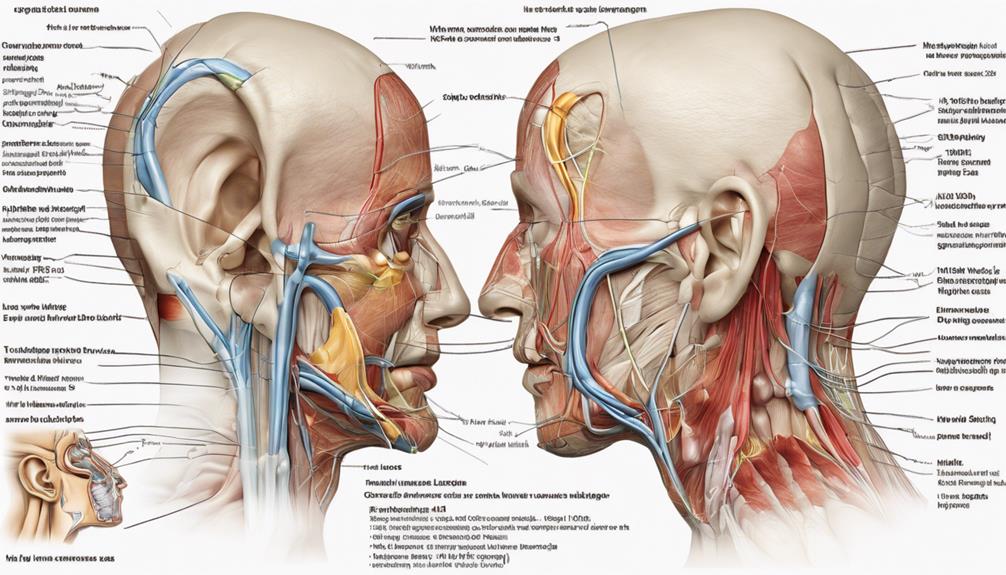
Exploring the complex structure of our sinus system, which resembles a maze of linked corridors, we are led to ponder: Is it possible that issues with our sinuses can indeed affect our ability to hear?
The relationship between sinus issues and hearing loss is a complex one, with various factors at play. Understanding how sinus problems can potentially affect our auditory senses is crucial for anyone experiencing discomfort in both areas.
Let's unravel the mystery behind this connection and shed light on how these seemingly unrelated concerns may be more intertwined than we realize.
Key Takeaways
- Sinus issues affect Eustachian tubes and ear pressure.
- Sinus blockages disrupt sound transmission in the ear.
- Symptoms include ear pain, altered hearing, and pressure.
- Treatment involves antibiotics, decongestants, and tailored care.
Overview of Sinus Problems and Hearing Loss
Sinus problems and hearing loss are intricately connected, with the impact on the ear canal and Eustachian tubes being significant factors in understanding this relationship. When sinuses become inflamed and swollen, they can result in increased pressure within the nasal passages. This increased pressure can then affect the Eustachian tubes, which are responsible for equalizing pressure in the middle ear. Due to this connection, individuals may experience symptoms such as ear pain, altered hearing, and a feeling of pressure or fullness in the ears.
If left untreated, sinus issues can lead to complications in the ear, potentially causing hearing loss. Seeking guidance from an ENT specialist is crucial in managing sinus-related hearing problems. These specialists can offer a proper diagnosis and recommend appropriate treatments, which may involve the use of nasal sprays to reduce inflammation and swelling in the sinuses. Proper care, including maintaining an upright head position and following the advice of medical professionals, can significantly alleviate sinus-related hearing issues.
Causes of Sinus-Related Hearing Issues
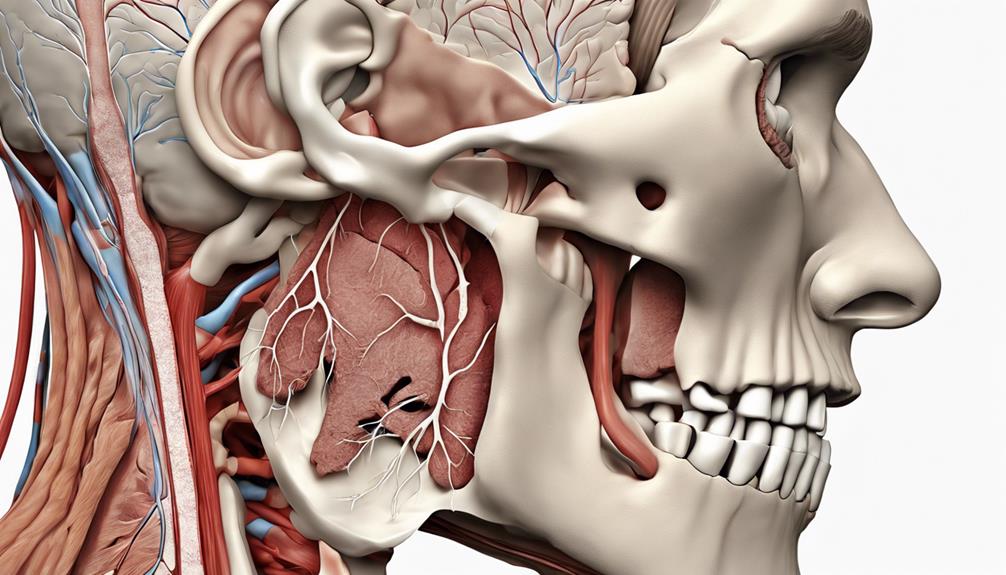
When blockages occur in the sinuses, they can directly impact the functionality of the ear canal and Eustachian tubes, leading to sinus-related hearing issues. Sinusitis, characterized by inflammation and swelling of the sinuses, can cause Eustachian tube blockage. This blockage disrupts the normal pressure balance in the middle ear, affecting the ability of the eardrum to vibrate efficiently in response to sound waves.
As a result, individuals may experience symptoms like ear pressure and muffled hearing. The connection between the sinuses and the ear is crucial for maintaining proper hearing function. Sinus blockages can impede sound transmission, leading to muffled or distorted sounds.
Understanding how sinusitis can impact the Eustachian tube and subsequently affect hearing is essential in managing sinus-related hearing issues effectively. Prompt attention to sinus problems that may cause Eustachian tube dysfunction can help prevent potential long-term hearing complications.
Symptoms of Hearing Loss Due to Sinus Problems
Experiencing symptoms of hearing loss related to sinus issues can include sensations of sounds seeming distant or underwater. Sinus problems, such as sinusitis, can lead to ear pain, pressure, and even infections, which in turn can affect the middle ear and cause hearing disturbances. The Eustachian tubes, responsible for equalizing pressure in the ears, can become blocked due to sinus congestion, disrupting sound transmission and resulting in partial hearing loss. Individuals with sinus-related hearing issues may also experience difficulty hearing clearly, along with a feeling of fullness or pressure in the ears. Prompt attention to sinus problems is crucial as untreated sinusitis can exacerbate these symptoms, leading to further hearing difficulties. Below is a table summarizing the key symptoms of hearing loss associated with sinus problems:
| Symptom | Description |
|---|---|
| Ear Pressure | Sensation of fullness or discomfort in the ears |
| Muffled Hearing | Sounds may seem distant or underwater |
| Ear Pain | Discomfort or pain in the ears |
| Hearing Loss | Partial or temporary loss of hearing |
| Blockage | Feeling of congestion or obstruction in the ears |
Treatment Options for Sinus-Related Hearing Loss
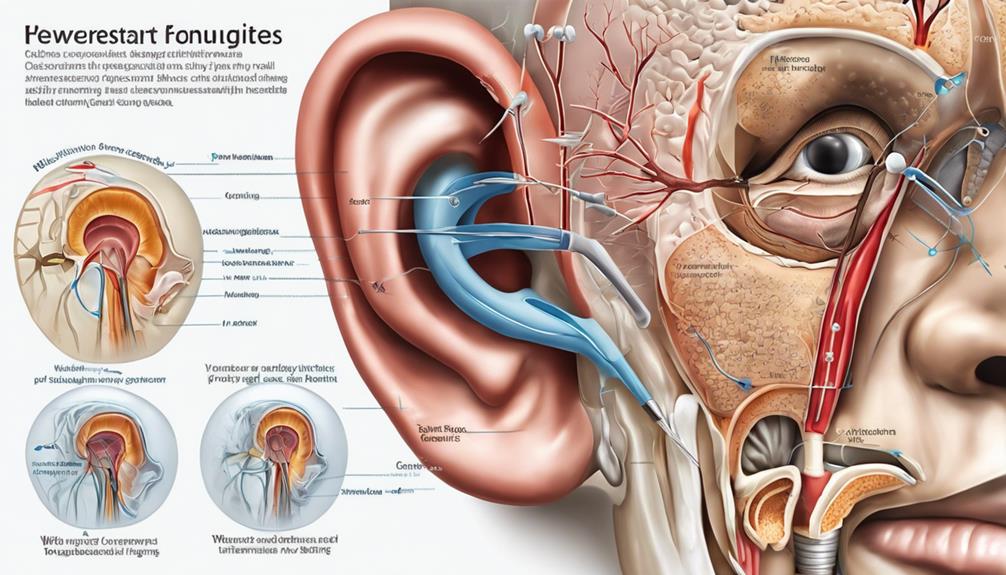
Addressing the underlying sinus infection with antibiotics is often a primary treatment option for managing sinus-related hearing loss. Antibiotics can help clear up the infection, reducing inflammation and swelling in the sinuses that may be impacting hearing.
In some cases, decongestants or nasal corticosteroid sprays may also be recommended to alleviate sinus pressure and further reduce inflammation. If the sinus problems persist and significantly affect hearing, more aggressive treatment options like sinus surgery or procedures to improve sinus drainage may be considered.
Seeking the expertise of an ENT specialist is crucial in determining the most appropriate treatment plan tailored to the individual's specific sinus issues and their impact on hearing. Timely and effective management of sinusitis is key in preventing or alleviating any associated hearing loss, highlighting the importance of seeking medical attention promptly to address sinus problems before they escalate and potentially cause hearing complications.
Preventing Hearing Loss Linked to Sinus Troubles
To prevent hearing loss associated with sinus troubles, proactive management of sinus issues is crucial in preserving optimal ear health and function. When considering the impact of sinus problems on hearing, it's essential to address these issues promptly to mitigate any potential long-term consequences.
Here are some key strategies to prevent hearing loss linked to sinus troubles:
- Consultation with an ENT Specialist: Seeking guidance from an Ear, Nose, and Throat specialist can help in diagnosing and treating sinus-related hearing issues effectively.
- Proper Treatment of Sinusitis: Treating sinusitis promptly can prevent complications such as otitis media, which can affect your hearing.
- Use of Home Remedies: Utilizing home remedies like humidifiers and nasal sprays can alleviate symptoms and reduce the risk of hearing impairment.
- Understanding Symptoms: Being aware of symptoms like ear pain, pressure in the ear, and partial hearing loss can aid in early intervention to preserve hearing health.
Frequently Asked Questions
How Do You Relieve Sinus Pressure in Your Ears?
We relieve sinus pressure in our ears by using warm compresses, nasal decongestants, saline nasal sprays, chewing gum, swallowing, and performing the Valsalva maneuver. These techniques help open the Eustachian tube and equalize pressure.
Steam inhalation and warm showers are also effective in loosening mucus and alleviating sinus pressure in the ears. By incorporating these methods, we can effectively manage and alleviate discomfort caused by sinus pressure in the ears.
What Does an ENT Do for Chronic Sinusitis?
When facing chronic sinusitis, ENT specialists have an arsenal of tools to tackle the issue. A thorough diagnosis through physical exams and imaging tests enables them to pinpoint the root cause.
From nasal endoscopy to identify blockages to tailored treatment plans involving nasal irrigation, steroids, antibiotics, or surgery, ENTs provide comprehensive care. Regular follow-ups ensure treatment efficacy.
How Long Does It Take to Fully Recover From Sinusitis?
Recovering from sinusitis depends on various factors, such as the type of sinusitis and individual health conditions. Acute sinusitis typically resolves within days to a couple of weeks with proper treatment, while chronic sinusitis may take weeks to months to fully recover.
Timely medical intervention, including antibiotics, can speed up the recovery process. Adhering to healthcare provider recommendations and managing symptoms effectively are vital for a quicker and complete recovery from sinusitis.
Can Sinus Issues Cause Hearing Loss?
Yes, sinus issues can cause hearing loss. When sinuses become congested, the Eustachian tubes can be affected, leading to muffled hearing and ear pressure.
Inflammation and swelling from sinus problems can disrupt the normal function of the ear, causing temporary hearing loss.
Seeking medical help promptly for sinusitis is crucial to prevent any further impact on hearing abilities.
Conclusion
In conclusion, sinus problems can indeed cause temporary hearing issues, like muffled hearing, due to blocked Eustachian tubes. However, with prompt treatment and proper care, these issues can be managed effectively.
Just like a well-tuned instrument can produce beautiful music, taking care of our sinus health can help ensure that our hearing remains crystal clear. Remember, listening to your body and seeking timely medical attention are key to preserving your hearing abilities.
Taylor brings a dynamic and analytical perspective to the Deaf Vibes team, focusing on research-driven content that educates and informs. With an unquenchable curiosity for new developments, policies, and social issues affecting the deaf and hard-of-hearing community, Taylor’s writing is a crucial resource for readers seeking to navigate these areas. Whether breaking down legal rights, highlighting educational opportunities, or offering guides on accessible technology, Taylor’s work is an invaluable asset to those seeking to empower themselves and others. Taylor’s commitment to accuracy and depth ensures that our readers have access to reliable and actionable information.
Understanding Hearing Loss
How Bad Teeth Can Cause Hearing Loss: Exploring the Connection
Lend an ear to the surprising link between bad teeth and hearing loss, revealing a connection that goes beyond what meets the eye.
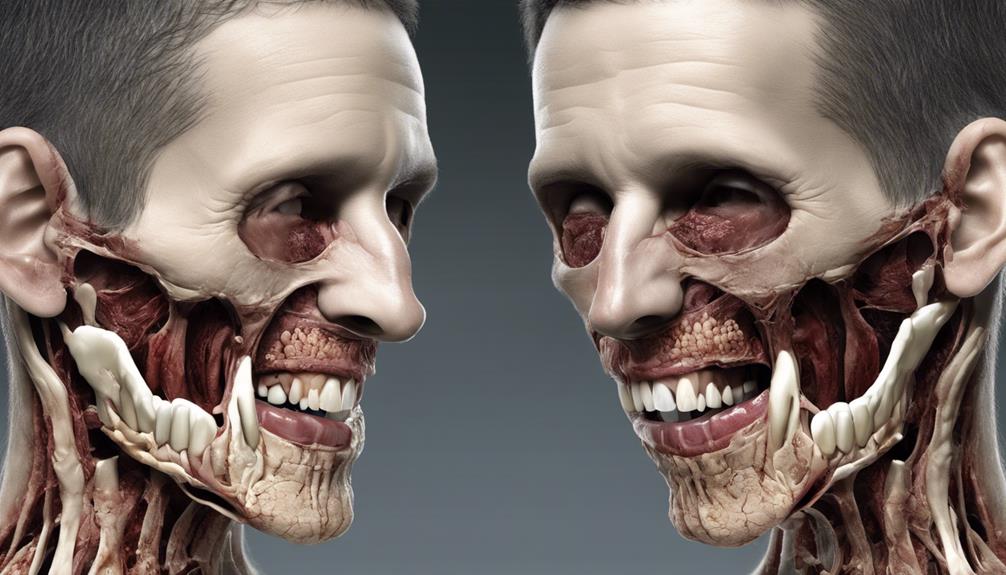
Envision a fragile network of interconnected routes inside our bodies, where the well-being of one system can influence another in surprising manners.
The intricate relationship between our teeth and our hearing may surprise many.
As we unravel the subtle yet significant link between dental health and auditory function, a deeper understanding emerges, shedding light on how something as seemingly separate as bad teeth can have a profound effect on our ability to perceive sound.
Let's explore this intriguing connection further and uncover the intricate mechanisms at play.
Key Takeaways
- Dental infections can lead to inflammation affecting blood circulation to the ears, potentially causing hearing loss.
- TMJ-related inflammation can disrupt sound signal transmission to the brain, impacting auditory nerve function.
- Impacted wisdom teeth can cause inflammation that disrupts blood flow to the inner ear, affecting hearing mechanisms.
- Temporary inflammation post-tooth extraction may result in muffled hearing or ear pain, requiring effective post-extraction care.
Dental Infections and Hearing Loss
Dental infections can lead to inflammation in the body, potentially causing disruptions in blood circulation that are linked to hearing loss. When harmful oral bacteria from these infections enter the bloodstream, they can interfere with the normal flow of blood to the ears. This disruption can have a direct impact on the delicate structures within the inner ear responsible for transmitting sound signals to the brain. The inflammation triggered by dental infections can affect the nerves associated with hearing, leading to potential issues in auditory perception.
Complications arising from untreated dental infections, such as abscesses, can further exacerbate problems in the inner ear and contribute to hearing difficulties. Proper treatment of these infections is crucial in preventing potential hearing loss associated with oral health issues. It's essential to address dental problems promptly to mitigate the risks posed to the intricate mechanisms involved in hearing function. By maintaining good oral health practices and seeking timely dental care, individuals can help safeguard their hearing abilities and overall well-being.
Impact of TMJ on Hearing

The impact of TMJ on hearing can be significant due to the potential inflammation affecting the Eustachian tube, leading to possible hearing issues. This connection between TMJ disorder and hearing loss underscores the intricate relationship between dental health and auditory function. Here are four key points to consider:
- Inflammation and Hearing: Chronic inflammation from TMJ can result in pain and discomfort, affecting the inner ear nerve pathway and potentially contributing to hearing loss.
- TMJ Disorder Effects: TMJ-related hearing loss occurs as inflammation impacts the auditory nerve, disrupting the transmission of sound signals to the brain.
- Symptoms and Hearing Changes: Symptoms of TMJ disorder, such as jaw pain and muscle tension, can influence the function of the Eustachian tube, leading to changes in ear function and hearing capabilities.
- Treatment and Restoration: Seeking treatment from a dentist or specialist for TMJ disorder can help alleviate inflammation-related hearing problems, potentially restoring auditory function and overall quality of life.
Wisdom Teeth and Auditory Issues
Impacted wisdom teeth can have a direct impact on auditory health by causing infections and inflammation that restrict blood vessels, potentially leading to hearing issues. The inflammation associated with impacted wisdom teeth can affect blood flow to the inner ear, disrupting the delicate mechanisms responsible for hearing. Infections stemming from these dental issues can further complicate matters by interfering with proper blood circulation to the auditory system, potentially resulting in hearing loss.
The proximity of wisdom teeth to the jaw joint and nerves can exacerbate auditory problems, as inflammation and nerve pain can radiate to the ears, causing discomfort and potentially affecting hearing. Proper dental hygiene and timely intervention for impacted wisdom teeth are crucial in mitigating the risk of developing auditory issues. By addressing wisdom teeth problems promptly, individuals can help safeguard against hearing problems linked to inflammation and blood flow disturbances, ultimately preserving their auditory health.
Tooth Extraction and Hearing Problems

Experiencing tooth extraction may lead to temporary inflammation, potentially causing issues such as muffled hearing or ear pain. When inflammation occurs post-tooth extraction, it can affect blood flow to the inner ear, impacting the function of auditory cells and leading to temporary hearing problems. Proper post-extraction care is crucial in managing inflammation to prevent prolonged hearing issues. Fortunately, hearing loss resulting from extraction-related inflammation is typically temporary and tends to resolve as the inflammation subsides. Consulting with a dentist following a tooth extraction is essential to address any concerns related to hearing problems promptly.
- Temporary inflammation post-tooth extraction can disrupt blood flow to the inner ear.
- Inflammation affecting auditory cells may result in muffled hearing or ear pain.
- Effective post-extraction care is vital for managing inflammation and preventing prolonged hearing problems.
- Consulting a dentist post-extraction can help address and alleviate any hearing-related issues that may arise.
Preventing Dental-Related Hearing Loss
Regular dental care is crucial for preventing potential hearing loss associated with dental issues. Good oral hygiene, such as daily brushing and flossing, is essential to prevent tooth infections that could lead to hearing problems.
Regular dental check-ups are vital for early detection of any dental problems that may impact hearing health. Timely treatment of issues like impacted wisdom teeth can prevent infections and inflammation that might affect blood flow to the ears, potentially causing hearing loss.
Promptly addressing TMJ disorder is important as it can help reduce inflammation that may impact the Eustachian tube, affecting auditory cells in the inner ear. Proper blood circulation to the ears through effective oral health management can help individuals take preventive measures against dental-related hearing loss.
Prioritizing dental care can safeguard against potential complications that could lead to issues with hearing in the future.
Frequently Asked Questions
What Are Three 3 Health Problems That Can Result From Poor Oral Hygiene?
When we neglect oral hygiene, we expose ourselves to various health risks. Gum disease can lead to tooth loss. Tooth decay causes pain and sensitivity. Oral infections can spread to other tissues, potentially causing abscesses and systemic health issues.
These consequences of poor oral hygiene highlight the importance of maintaining good dental care habits for overall health and well-being.
Can Rotten Teeth Affect Your Hearing?
Yes, rotten teeth can indeed affect hearing. When teeth decay, harmful bacteria can enter the bloodstream, causing inflammation that impacts blood flow to the ears. This inflammation can narrow blood vessels, affecting circulation to the inner ear and potentially leading to hearing loss.
Neglecting dental care and allowing teeth to decay increases the risk of inner ear complications that can harm hearing function. Proper oral hygiene and timely treatment are crucial to prevent such issues.
Can a Bad Tooth Cause Inner Ear Problems?
Yes, a bad tooth can cause inner ear problems. When dental issues like infections or decay are left untreated, bacteria can travel from the mouth to the inner ear, disrupting its functions.
This bacterial spread can lead to symptoms such as dizziness, vertigo, tinnitus, and even hearing loss. Maintaining good oral hygiene is essential to prevent these complications and safeguard overall health.
What Are the Symptoms of Poor Dental Hygiene?
Poor dental hygiene manifests through symptoms like bad breath, tooth decay, gum disease, and tooth sensitivity. Signs of poor oral health include a persistent bad taste, swollen or bleeding gums, and loose teeth.
Neglect can lead to cavities, abscesses, tooth loss, inflamed gums, tooth pain, and visible tartar buildup. Neglecting dental care can result in oral infections, sores, and difficulty with chewing or swallowing.
Conclusion
In conclusion, the intricate link between dental health and hearing underscores the importance of maintaining proper oral hygiene. Neglecting teeth can lead to a domino effect of issues, from infections to inflammation, impacting blood flow and potentially causing hearing loss.
As the saying goes, 'prevention is better than cure,' so prioritizing regular dental check-ups and good oral care practices is crucial in safeguarding not just your smile, but also your hearing.
Taylor brings a dynamic and analytical perspective to the Deaf Vibes team, focusing on research-driven content that educates and informs. With an unquenchable curiosity for new developments, policies, and social issues affecting the deaf and hard-of-hearing community, Taylor’s writing is a crucial resource for readers seeking to navigate these areas. Whether breaking down legal rights, highlighting educational opportunities, or offering guides on accessible technology, Taylor’s work is an invaluable asset to those seeking to empower themselves and others. Taylor’s commitment to accuracy and depth ensures that our readers have access to reliable and actionable information.
-
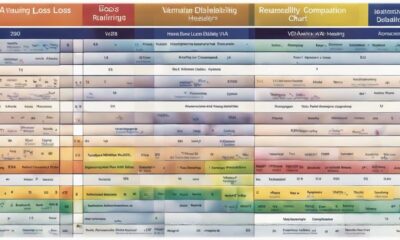
 Navigating the VA System1 month ago
Navigating the VA System1 month agoVA Hearing Loss Rating Chart: Understanding Disability Compensation
-

 Vetted1 month ago
Vetted1 month ago15 Best Oticon Hearing Aids to Improve Your Hearing in 2024
-

 Therapies and Interventions1 day ago
Therapies and Interventions1 day ago10 Auditory Processing Goals for Effective Speech Therapy
-

 Sign Language3 months ago
Sign Language3 months agoMastering the Art of Signing Letters in Sign Language
-

 Navigating the VA System4 weeks ago
Navigating the VA System4 weeks agoUnderstanding Bilateral Hearing Loss VA Rating Criteria
-

 Sign Language4 days ago
Sign Language4 days agoSign Language Emoji Translator: How to Communicate With Gestures
-

 Tinnitus1 month ago
Tinnitus1 month agoVA's Rating System for Tinnitus and Hearing Loss Explained
-

 Sign Language2 months ago
Sign Language2 months agoMedical Sign Language PDF: A Comprehensive How-To Guide


















